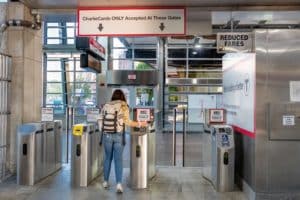
An MBTA rider taps their Charlie Card to enter a fare gate the Red Line's Charles/MGH station in this undated photo. MBTA photo
Senators will try to convince their House colleagues the time is right to make another pass at mandating a low-income fare program at the MBTA, reviving the specter of a gubernatorial veto during the coming late-session flurry.
Along the way to unanimously approving a $10.84 billion infrastructure bond bill Thursday, the Senate adopted a suite of amendments that moved the measure further away from the version the House approved, including a new requirement for the T to undergo a third-party safety audit every year, $25 million in additional funding for a western Massachusetts rail expansion, and the latest push to offer free or reduced transit fares to lower-income riders.
Lawmakers will need to reconcile those differences before they can send the legislation to Gov. Charlie Baker, who in April filed his own $9.7 billion version of the bill.
In addition to billions of dollars to fund improvements to roads, bridges, public transit and electric vehicle infrastructure, the Senate bill (S.2989) makes $400 million available for the MBTA to address safety faults exposed by a federal investigation and calls for $275 million to advance East-West Rail work.
Senators adopted an amendment from East Boston Sen. Lydia Edwards that requires the MBTA to widely roll out a free or reduced fare program and authorizes the Regional Transit Authority Council to support similar moves at individual RTAs.
Edwards said the $90 cost for a monthly pass on the T’s bus and subway network is a burden for many riders who do not earn much, and the commuter rail – where monthly passes can climb above $400 – poses even greater obstacles.
“A lack of access to commuter rail is something that could impact a person’s life by losing years of life just commuting to work,” she said. “The commuter rail is the lifeblood for a lot of people, and what we’re finding consistently is because of costs, a lot of poor people, a lot of hard-working poor people cannot take the commuter rail.”
Why The Push?
Reducing the price of fares for qualifying commuters looms as one of the thorniest topics House-Senate negotiators will tackle.
In the dying hours of the 2019-2020 lawmaking session, both branches approved a transportation bond bill featuring a nearly identical low-income fare section. Baker vetoed that portion, saying at the time that such a program would not be viable until transit agencies had a plan to replace lost fare revenue.
The House opted against digging in on the issue again this session, quietly spiking a similar amendment when it approved its infrastructure bond bill (H.4897) last month.
Baker has not indicated if he would veto a similar mandate again this session, and his press team did not respond to a News Service request for comment Thursday evening.
In February, MBTA staff projected it would cost between $52 million and $85 million annually to offer a 50-percent fare discount for riders who earn 200 percent or less of the federal poverty limit while keeping service at existing levels. The program would also attract between 49,000 and 89,000 bus and transit riders, T officials said.
Other additions the Senate made to its bill via amendment include $6.9 million to expand fare-free bus pilots, $10 million to run daily ferry service to Long Island for individuals seeking mental health and substance use disorder treatment, and a requirement for the MBTA to chart a course in the next 17 months to fully electrify its commuter rail system.
Both the House-approved bill and the Senate Ways and Means Committee version authorized $250 million toward a long-sought passenger rail expansion west of Worcester, but senators voted Thursday to pack on another $25 million.
“The $250 million authorization is the single-largest authorization for a single project in the entire package, but we want to raise it a bit more,” said Longmeadow Sen. Eric Lesser, who filed the amendment increasing the funding to $275 million. “$250 million is significant, but we want to give as much of a signal as possible to the federal government and to the rest of the state that we are serious about getting this project done.”
Lesser’s original amendment called for doubling the bond authorization for the rail project to $500 million, but he redrafted his measure to scale down the increase to 10 percent before it emerged for a vote.
More Debates to Come
The final funding level for East-West Rail will likely be decided in conference committee negotiations, where lawmakers will craft a compromise version of the bill to send to Baker. But with state coffers overflowing with tax dollars and pressure to strike a quick accord growing, they might not hesitate to adopt the Senate’s slightly larger proposal.
Regardless of where lawmakers land, the infrastructure bond bill will not cover the full cost of the rail expansion, which the Department of Transportation in 2020 estimated would range between $2.4 billion and $4.6 billion. The money instead will represent an initial salvo to move East-West Rail from a long-discussed and studied hypothetical to a project in the works.
Another successful amendment from Edwards calls for using $28 million to launch a pilot program offering multi-stop ferry service connecting several North Shore cities, Boston and one community on the South Shore.
The pilot program would need to run for between three and five years with stops in at least Gloucester, Salem, Lynn, Winthrop, East Boston, Boston’s North End, South Boston and Quincy.
Supporters said an expanded ferry network could appeal both to daily commuters and to tourists, getting more cars off the road particularly amid the mind-numbing traffic impacts of the project closing the Sumner Tunnel for long stretches for rehabilitation work.
The Senate could soon vote on a second major borrowing and spending bill, with an economic development bill featuring bond authorizations, surplus spending and American Rescue Plan Act allocations moving through the House on Thursday. That impending action was on senators’ minds during their infrastructure debate. Quincy Sen. John Keenan introduced amendments dealing with commuter benefits but then withdrew them.






